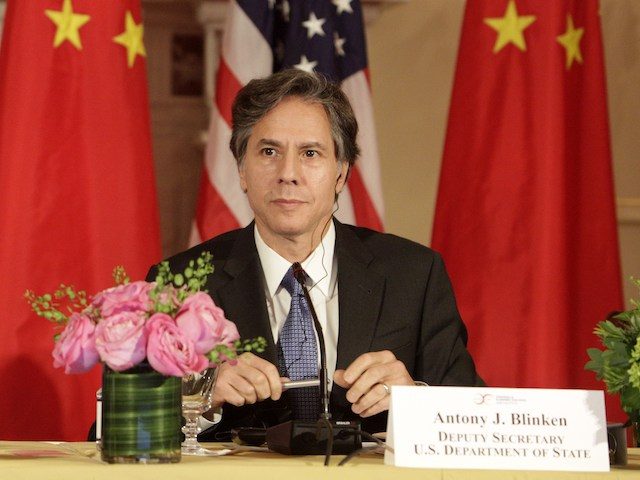U.S. Secretary of State Antony Blinken announced Wednesday he and National Security Advisor Jake Sullivan will stop in Alaska next week to meet with their Chinese counterparts, raise objections to Beijing’s efforts to undermine America, and explore potential avenues of cooperation.
Blinken and Sullivan will meet with Yang Jiechi, a member of the ruling communist Politburo, and Foreign Minister Wang Yi on the way back from a trip to visit America’s allies Japan and South Korea alongside Pentagon chief Lloyd Austin starting next Sunday.
The meeting in Alaska will mark the highest-level in-person exchange between the U.S. and China since the Biden administration took office in January. President Joe Biden and Chinese dictator Xi Jinping spoke by phone on February 10.
Asked to comment on the upcoming meeting in Alaska during a House Foreign Affairs hearing on Wednesday, Blinken responded:
This is an important opportunity for us to layout and very frank terms the many concerns that we have with Beijing’s actions and behavior that are challenging the security, prosperity, and the values of the United States and our partners and allies.
So, we intend to raise, and we will raise, the host of issues, some of which have already been touched on today, that concern us [including Blinken echoing Trump’s position that China is committing genocide against the predominantly Muslim Uighurs in Xinjiang].
Blinken stressed the U.S. would continue to explore areas for cooperation with China while ensuring the U.S. has a level playing field allowing American companies and workers to benefit from the mutual relations between the two largest global economies.
The U.S.-China relationship is “the most consequential relationship that we have in the world,” Blinken testified, adding:
China, uniquely, has an ability militarily, diplomatically, economically to undermine the international rules-based system that the United States has devoted so much effort to building, and that does advance the interests and values of our people.
So we’re going to be making very clear to our counterparts in China the deep concerns, objections that we have to some of the things that they’re doing and to see if they will address those concerns.
Blinken emphasized follow-up engagements will be contingent upon the United States “seeing tangible progress and tangible outcomes on the issues of concern to us.”
“Our relationship with China will be competitive when it should be, collaborative when it can be, and adversarial when it must be,” Blinken noted in his written testimony. “The common denominator is the need to engage China from a position of strength.”
Strained U.S.-China relations hit their lowest level in decades under former President Donald Trump, who stood up to the communist country resulting in both countries intensifying sanctions and tariffs, expelling journalists, and closing consulates.
During his confirmation hearing, Blinken praised Trump for being “tougher” on China than the Obama-Biden admin. Blinken suggested the Biden Administration would embrace the “basic principle” of Trump’s approach, emphasizing the State Department would seek areas of cooperation.
Some Chinese diplomats indicated they are open to better ties with America. So far, however, they offered few signs towards a compromise on areas of tension — from China’s human rights abuses in Muslim-majority Xinjiang province, home to the Uighurs, to the Asian giant’s territorial claims and militarization of the South China Sea, Bloomberg noted.

COMMENTS
Please let us know if you're having issues with commenting.